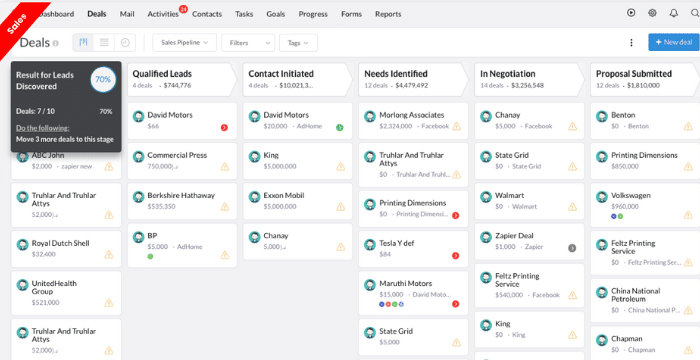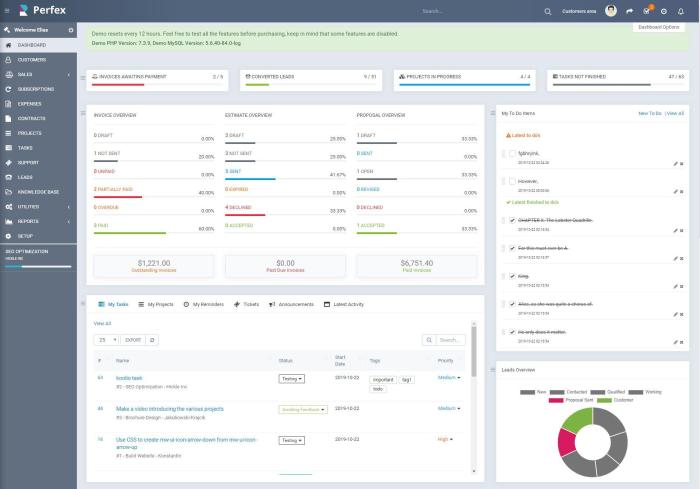Crm and project management software – In today’s dynamic business environment, efficient organization and streamlined workflows are paramount. This necessitates the strategic implementation of robust software solutions. Two key players in this arena are Customer Relationship Management (CRM) software and Project Management software. While distinct in their core functionalities, these systems often complement each other, creating a powerful synergy for increased productivity and profitability. This detailed guide will explore the intricacies of both, highlighting their individual strengths, potential integrations, and the benefits of combining them.
Understanding CRM Software: Cultivating Customer Relationships
CRM software, at its core, is designed to manage and analyze customer interactions and data throughout the customer lifecycle. This encompasses everything from initial contact to ongoing engagement and retention. Effective CRM systems centralize all customer information, providing a 360-degree view of each individual or business. This holistic perspective empowers businesses to personalize interactions, anticipate needs, and improve customer satisfaction.
Key Features of CRM Software:
- Contact Management: Centralized storage and organization of customer contact details, communication history, and interactions.
- Sales Management: Tracking leads, managing sales pipelines, forecasting sales, and automating sales processes (e.g., lead scoring, opportunity management).
- Marketing Automation: Automating marketing tasks such as email campaigns, social media posting, and targeted advertising.
- Customer Service Management: Managing customer support tickets, tracking resolution times, and improving customer service efficiency (e.g., help desk integration).
- Reporting and Analytics: Generating reports on key performance indicators (KPIs) to track progress and identify areas for improvement. This includes sales performance, customer satisfaction, and marketing campaign effectiveness.
- Integration Capabilities: Connecting with other business systems such as email marketing platforms, e-commerce platforms, and accounting software.
Popular CRM Software Examples:
- Salesforce
- HubSpot
- Microsoft Dynamics 365
- Zoho CRM
- SAP CRM
Understanding Project Management Software: Streamlining Workflows
Project management software facilitates the planning, execution, monitoring, and completion of projects. These tools provide a centralized platform for teams to collaborate, track progress, manage resources, and ensure projects stay on schedule and within budget. Effective project management software enhances team communication, improves transparency, and reduces the risk of project failure.
Key Features of Project Management Software:
- Task Management: Assigning tasks, setting deadlines, and tracking progress on individual tasks.
- Gantt Charts: Visual representations of project timelines, dependencies, and milestones.
- Kanban Boards: Visual workflow management tools that help teams track the progress of tasks through different stages.
- Resource Management: Allocating and managing resources (human resources, budget, equipment) effectively.
- Collaboration Tools: Facilitating communication and collaboration among team members through features such as file sharing, messaging, and video conferencing.
- Reporting and Analytics: Tracking project performance against key metrics, identifying bottlenecks, and providing insights for improvement.
- Time Tracking: Monitoring the time spent on different tasks to improve project estimations and resource allocation.
Popular Project Management Software Examples:
- Asana
- Trello
- Jira
- Monday.com
- Microsoft Project
The Synergistic Power of CRM and Project Management Integration
While distinct, CRM and project management software can work together seamlessly to enhance operational efficiency. Integrating these systems allows for a more holistic view of the business, improving communication, and ultimately driving better outcomes. For instance, project management software can track the progress of customer-related projects, while CRM can provide valuable customer insights to inform project planning and execution.
Benefits of Integration:, Crm and project management software
- Improved Customer Satisfaction: By understanding customer needs and preferences through CRM data, project teams can deliver projects that better meet those needs.
- Enhanced Collaboration: Seamless data flow between systems improves communication and collaboration between sales, marketing, and project teams.
- Increased Efficiency: Automating tasks and workflows across both systems streamlines processes and reduces manual effort.
- Better Resource Allocation: Project management software can leverage CRM data to optimize resource allocation based on customer priorities and project needs.
- Improved Project Delivery: Integrating customer feedback from CRM into project management processes allows for more agile and responsive project delivery.
- Data-Driven Decision Making: Combined data from both systems provides a comprehensive view of business performance, enabling data-driven decision making.
Choosing the Right Software: Key Considerations: Crm And Project Management Software
Selecting the appropriate CRM and project management software depends on various factors, including business size, industry, budget, and specific needs. Consider the following factors when making your decision:

Source: hashmicro.com
- Scalability: Ensure the software can grow with your business.
- Integration Capabilities: Check for compatibility with existing systems.
- User-Friendliness: Choose software that is easy to learn and use for your team.
- Customization Options: Look for software that can be tailored to your specific requirements.
- Customer Support: Ensure reliable customer support is available.
- Cost: Consider both the initial cost and ongoing maintenance fees.
Frequently Asked Questions (FAQ)
- Q: What is the difference between CRM and project management software?
A: CRM focuses on managing customer relationships and data, while project management software focuses on planning, executing, and monitoring projects. They serve distinct but complementary purposes. - Q: Can I use CRM and project management software separately?
A: Yes, you can use them independently, but integrating them often leads to greater efficiency and improved outcomes. - Q: What are the benefits of integrating CRM and project management software?
A: Integration improves collaboration, enhances customer satisfaction, increases efficiency, and enables data-driven decision making. - Q: How do I choose the right CRM and project management software for my business?
A: Consider your business size, industry, budget, specific needs, scalability, integration capabilities, user-friendliness, customization options, and customer support. - Q: Are there free CRM and project management software options?
A: Yes, several free or freemium options are available, but they often have limitations compared to paid versions.
Conclusion
Implementing effective CRM and project management software is crucial for modern businesses striving for efficiency and growth. While each system offers unique capabilities, their combined power unlocks significant synergies. By carefully evaluating your business needs and selecting the right software solutions, you can optimize workflows, improve customer relationships, and ultimately achieve greater success. Consider exploring the various options available and investing in a system that aligns with your long-term strategic goals.
References:
Call to Action:
Ready to streamline your business operations and boost your bottom line? Contact us today for a free consultation to discuss your specific needs and explore the best CRM and project management solutions for your organization!

Source: ntaskmanager.com
Question Bank
What are the key benefits of integrating CRM and project management software?
Improved communication, enhanced collaboration, better resource allocation, increased efficiency, data-driven decision-making, and ultimately, improved profitability.
What types of businesses benefit most from this integration?

Source: knowboard.de
Businesses of all sizes, particularly those with complex projects and a significant client base, can significantly benefit. This includes agencies, consulting firms, software development companies, and any organization managing multiple projects concurrently.
What are some common challenges in integrating these systems?
Data migration complexities, system compatibility issues, and the need for comprehensive employee training are common challenges. Careful planning and selection of compatible systems are crucial for a smooth integration process.
How much does CRM and project management software integration typically cost?
Costs vary widely depending on the specific software chosen, the number of users, and the level of customization required. It’s essential to obtain quotes from various vendors to compare pricing and features.
